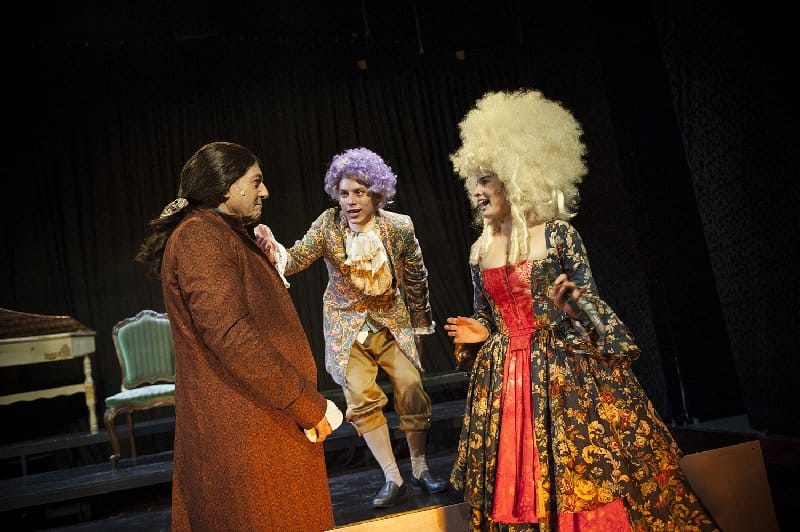In the 1970s, playwright Peter Shaffer wrote two masterpieces: “Equus,” the story of a boy who hammers nails into the eyes of horses, and “Amadeus,” chronicling the life and death of Wolfgang Amadeus Mozart. Of the two, “Amadeus” was by far the more successful, winning a Tony Award for Best Play, followed by a 1985 film adaptation that won an Academy Award for Best Picture (plus tons of other prizes and accolades).
More importantly, theaters of all sizes routinely produce “Amadeus,” and all kinds of people have seen the movie, whether they give a fig about classical music or not. The story is big and historical, and its central rivalry is among the bitterest and most spectacular in contemporary drama. “Amadeus” has been rewritten numerous times, and the script has several different endings. This is all to say that the play, like Mozart’s music, has a special power. People love it, and they will keep loving it for years to come.
Now, thanks to Teatro Espressivo in Curridabat, you can see “Amadeus” in Spanish. You would think that the 18th-century dialogue would be challenging to translate, but the adaptation is smooth and coherent. Director Carlos Salazar has turned a difficult, esoteric story into something accessible and even fun, and this “Amadeus” deserves its packed houses.
The narrator of “Amadeus” is Antonio Salieri, a successful composer in Hapsburg Vienna. That was a zeitgeist of operas, gold chandeliers, and gigantic wigs, and great composers were the rock stars of the era. Salieri’s only love is music, and for a long time he fancies himself a great musician. Salieri is also middle-aged, stodgy, and cunning, and his vaulted self-obsession should merit its own personality disorder.
Along comes Mozart, a goofy, drunken, womanizing young man who is also the most talented composer who ever lived. He can improvise a piano étude or recite an entire symphony from memory. Among his numerous annoying habits are (1) making loud farting noises and (2) emitting a high-pitched giggle. Salieri can’t stand Mozart, but he is also rabidly jealous of Mozart’s musical gifts. What follows is mutual assured destruction: Clumsy, big-mouthed Mozart is no match for powerful, vengeful Salieri, yet Salieri will never attain Mozart’s greatness. The finale is deeply unsettling, but also darkly funny.
The stage play is already very different from the film, and Salazar takes that difference one step farther. The play uses a recurring chorus – spare characters who both whisper the gossip of Vienna and play Salieri’s personal henchmen. Their presence is already fairly “stagey,” with its overlapping whispers and echoes, but Salazar turns these characters into clowns as well: They pantomime their speeches, use silly voices, and fall over each other. Much of Salazar’s staging is physical and even cartoonish. If Spanish is your second language, this acrobatic blocking can be helpful to understanding the story, but it may also seem a little melodramatic.
Indeed, the play’s running gag comes from the Emperor Joseph II, here played by a gently comic Fernando Montero. “A little too much enthusiasm,” says the emperor to Mozart, every time the composer shows a flash of mania. The same could be said of the Espressivo production: As Mozart, Javier Montenegro is downright hyperactive, cackling at everything and bouncing around the stage like a startled bee. Noelia Campos plays his wife Constanza Weber, and she shows the girlish equivalent: She laughs and blushes and squeaks and sways. When she’s upset, she gives Mozart a punitive swat. The nervous activity onstage is dizzying, and no doubt Salazar is attempting to counterbalance the long monologues about the power of art and other topics.
The production’s anchor is Leonardo Perucci, who plays Salieri exactly as he should: a frustrated elder with a gleeful appreciation for revenge. Perucci appears to love his role, performing a scene and then breaking from it to deliver a monologue directly to the audience. Perucci adds an Italian flair to his speech, which blends nicely with the Spanish translation, like violin solos in the middle of a fugue. Perucci must remain on stage at all times, and he must recite hundreds of lines. He is the play, more than even Amadeus himself.
Through Perucci’s guidance, a slow first act is followed by an excellent second act. The denouement stirs the right emotions, and Campos and Montenegro show admirable chemistry in the play’s final scenes. The best moments unfold when the two actors shed their giddiness, and they portray Mozart and Contanza as a snippy, desperate couple, mired in poverty and despair. The enthusiasm evaporates, and a more genuine performance emerges.
In general, this “Amadeus” sticks to the script – until the very end, when Salazar makes a shocking directorial choice. I don’t want to ruin it, so let’s just say that Mónica López has a magnificent voice, and her cameo at the end of the play took me completely by surprise. I can’t imagine that Shaffer, in any of his revisions, ever intended Salieri to encounter a “Queen of the Night,” as López’s character is credited. But maybe, like Mozart, the addition is just ahead of its time.
“Amadeus” continues through Oct. 12 at Teatro Espressivo, Curridabat. Fri. & Sat., 8 p.m.; Sun., 6 p.m. ₡5,000-10,000 ($10-20). Info: Teatro Espressivo website.






